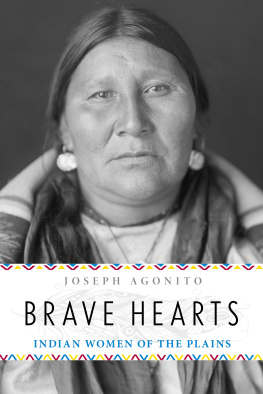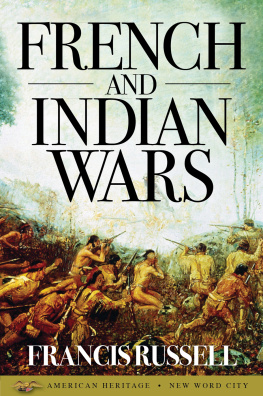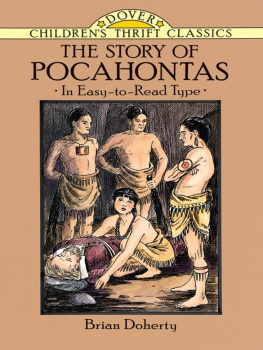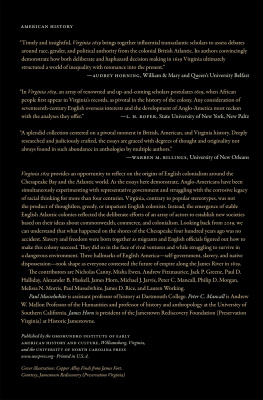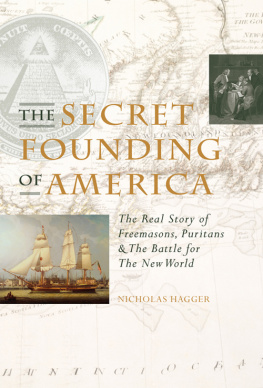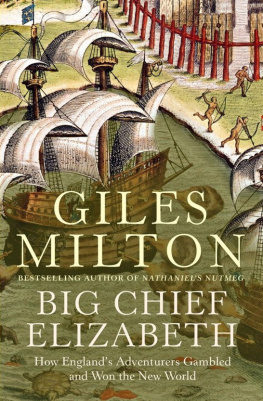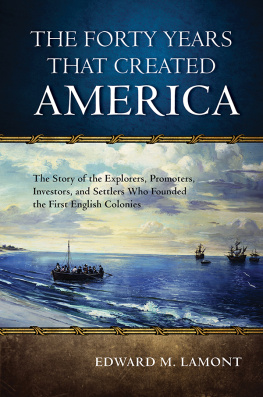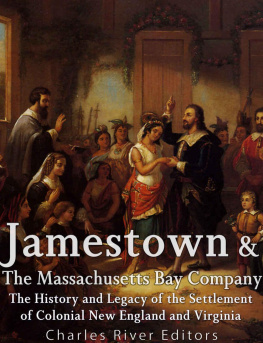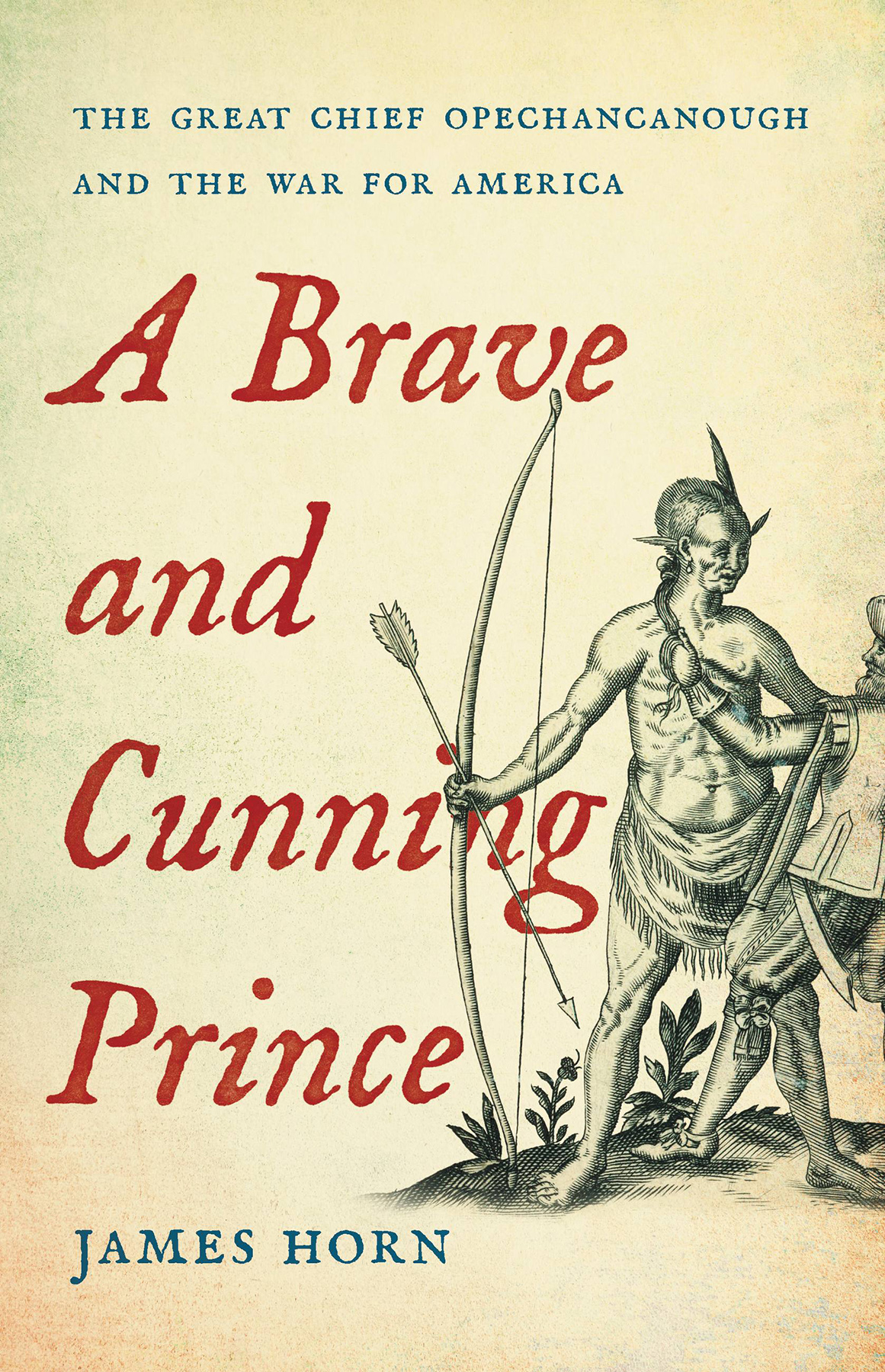Few individuals, European or Native American, had as much impact on early America as the Pamunkey leader Opechancanough. In A Brave and Cunning Prince , the renowned historian of early Virginia, James Horn, offers a masterclass on historical reconstruction and narrative style, deeply informed by an unparalleled mastery of evidence and sensitivity to the nuances of lived experience. Horn takes us across a century and the entire Atlantic basin, enlightening at every unexpected twist and turn. Opechancanough, a monumental figure, comes to prominence again in this true-life page-turner of narrative history.
Peter C. Mancall, author of The Trials of Thomas Morton
Like most Native people in early American history, Opechancanough generally plays a brief part as a violent and tragic figure. In contrast, James Horn constructs a remarkable life story that spanned a century. At a time when America is digging more deeply into its origins, this eye-opening narrative challenges well-worn tales of Pocahontas and congenial first encounters with a grim record of kidnapping, starvation, and total war.
Colin G. Calloway , author of The Indian World of George Washington
This book tells the story of one of the most fascinating figures in American historythe older brother of the more famous man we know as Powhatan. Most Americans probably have never heard of Opechancanough, but A Brave and Cunning Prince makes it clear that his name ought to ring in our mythology with the tragic names of Chief Joseph of the Nez Perce, Sitting Bull and Crazy Horse of the Sioux, the Apaches Geronimo, and the Comanches Quanah Parker. Opechancanoughs experiences and travels rival those of John Smith, and his leadership was demonstrably more effective. Though eclipsed in the records by both Smith and his own brother, Opechancanough might have been the most important of the three. Opechancanoughs story is long overdue, and who better to tell the tale than our generations foremost authority.
Joseph Kelly , author of Marooned: Jamestown, Shipwreck, and a New History of Americas Origin
A Brave and Cunning Prince is brilliant, stunning, original, and un-put-downable. Horns gripping prose and remarkable detective skills transport the reader to the Chesapeake Bay, Madrid, Mexico City, Havana, and London and into the mind of the talented, indefatigable Powhatan chief, Opechancanough. Upending the traditional Jamestown colonization narrative, Horn centers the Powhatan people, uncovering their priorities and their perceptions of the invaders who tried to colonize their land. Horn has crafted a magnificent, important biography, essential reading for anyone who seeks to understand early America.
Lorri Glover , Saint Louis University
James Horn combines cutting-edge scholarship with vivid, accessible prose in this sweeping narrative of Opechancanoughs eventful and eye-opening life story.
James Rice , author of Tales from a Revolution: Bacons Rebellion and the Transformation of Early America
James Horn has produced the first full biography of Paquinquineo/Opechancanough, making a compelling case that these two important figures in the Indigenous history of Virginia were one and the same. This transatlantic biography will be of great value to anyone interested in the vast history of what in Horns hands becomes an Algonquian Atlantic.
Michael Leroy Oberg , SUNY-Geneseo
1619: Jamestown and the Forging of American Democracy
A Kingdom Strange: The Brief and Tragic History of the Lost Colony of Roanoke
Capt. John Smith: Writings, with Other Narratives of Roanoke, Jamestown, and the First English Settlement of America
A Land As God Made It: Jamestown and the Birth of America
Adapting to a New World: English Society in the Seventeenth-Century Chesapeake
Copyright 2021 by James Horn
Cover design by Ann Kirchner
Cover images: Courtesy of the John Carter Brown Library; ilolab / Shutterstock.com
Cover copyright 2021 by Hachette Book Group, Inc.
Hachette Book Group supports the right to free expression and the value of copyright. The purpose of copyright is to encourage writers and artists to produce the creative works that enrich our culture.
The scanning, uploading, and distribution of this book without permission is a theft of the authors intellectual property. If you would like permission to use material from the book (other than for review purposes), please contact permissions@hbgusa.com. Thank you for your support of the authors rights.
Basic Books
Hachette Book Group
1290 Avenue of the Americas, New York, NY 10104
www.basicbooks.com
First Edition: November 2021
Published by Basic Books, an imprint of Perseus Books, LLC, a subsidiary of Hachette Book Group, Inc. The Basic Books name and logo is a trademark of the Hachette Book Group.
The Hachette Speakers Bureau provides a wide range of authors for speaking events. To find out more, go to www.hachettespeakersbureau.com or call (866) 376-6591.
The publisher is not responsible for websites (or their content) that are not owned by the publisher.
Library of Congress Cataloging-in-Publication Data
Names: Horn, James P. P., author.
Title: A brave and cunning prince : the great chief Opechancanough and the war for America / James Horn.
Description: First edition. | New York : Basic Books, 2021. | Includes bibliographical references and index.
Identifiers: LCCN 2021009603 | ISBN 9780465038909 (hardcover) | ISBN 9781541600034 (ebook)
Subjects: LCSH: Opechancanough, 1646. | Powhatan IndiansVirginiaJamestownBiography. | Powhatan IndiansVirginiaJamestownHistory. | Jamestown (Va.)History. | Powhatan, approximately 15501618. | Pocahontas, 1617.
Classification: LCC E99.P85 H67 2021 | DDC 975.5004/973470092 [B]dc23
LC record available at https://lccn.loc.gov/2021009603
ISBNs: 9780465038909 (hardcover), 9781541600034 (ebook)
E3-20210921-JV-NF-ORI
For Sally, Liz, Ben, and Alice, with love
before the end of two Moones there should not be an Englishman in all their Countries.
Opechancanough to the chief of the Patawomecks, 1622
For the convenience of the reader, I have altered the spelling and punctuation of historical passages to conform to modern conventions and converted dates to the modern calendar. Throughout the book, I have sought as far as possible to present Indian perspectives on the events that shaped their lives during these formative years. However, it is important to keep in mind that while the peoples who made up the Powhatan chiefdom held strong views about their identity and culture, unlike Europeans they did not possess a written language and therefore were unable to record their histories and beliefs in writing. Instead, they passed their collective knowledge of the past from generation to generation by word of mouth. Necessarily, therefore, descriptions of Paquiquineo, Powhatan, and Opechancanough, as with other Indians, are based on Spanish and English accounts of the period. Sadly, we rarely hear the voices of Indian peoples and hence are forced to speculate about what motivated them by studying their actions. The nearest we come to the authentic words of the people themselves are those rare occasions when Europeans reported their words verbatim or in summary, such as when Captain John Smith met Powhatan and Opechancanough in a number of remarkable face-to-face negotiations.


